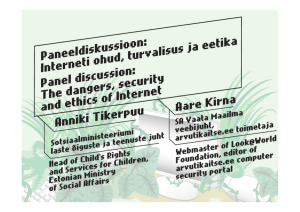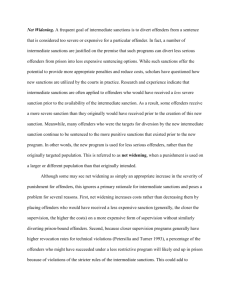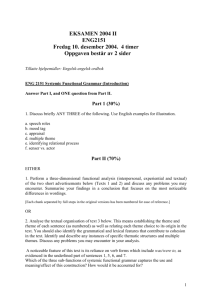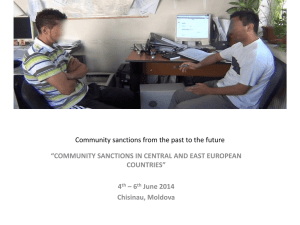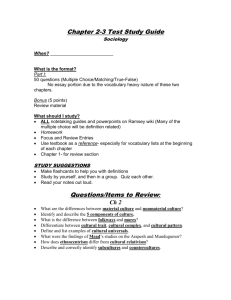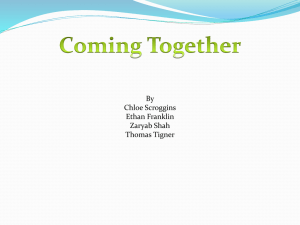Read the Tender Notice HERE
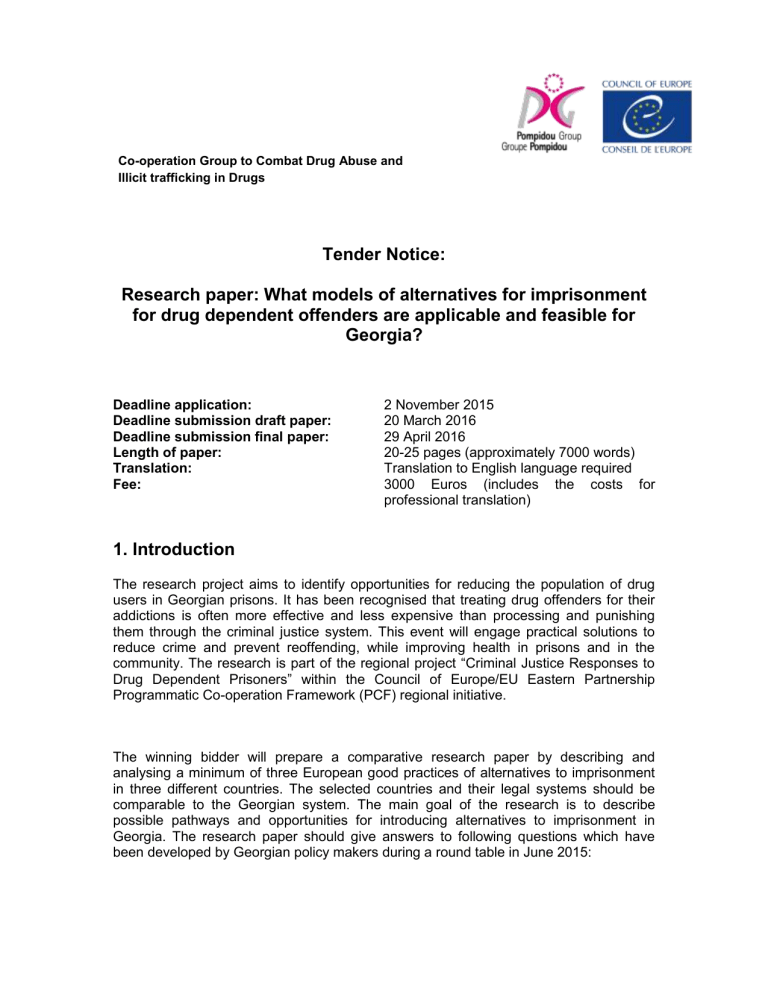
Co-operation Group to Combat Drug Abuse and
Illicit trafficking in Drugs
Tender Notice:
Research paper: What models of alternatives for imprisonment for drug dependent offenders are applicable and feasible for
Georgia?
Deadline application:
Deadline submission draft paper:
Deadline submission final paper:
Length of paper:
Translation:
Fee:
2 November 2015
20 March 2016
29 April 2016
20-25 pages (approximately 7000 words)
Translation to English language required
3000 Euros (includes the costs for professional translation)
1. Introduction
The research project aims to identify opportunities for reducing the population of drug users in Georgian prisons. It has been recognised that treating drug offenders for their addictions is often more effective and less expensive than processing and punishing them through the criminal justice system. This event will engage practical solutions to reduce crime and prevent reoffending, while improving health in prisons and in the community. The research is part of the regional project “Criminal Justice Responses to
Drug D ependent Prisoners” within the Council of Europe/EU Eastern Partnership
Programmatic Co-operation Framework (PCF) regional initiative.
The winning bidder will prepare a comparative research paper by describing and analysing a minimum of three European good practices of alternatives to imprisonment in three different countries. The selected countries and their legal systems should be comparable to the Georgian system. The main goal of the research is to describe possible pathways and opportunities for introducing alternatives to imprisonment in
Georgia. The research paper should give answers to following questions which have been developed by Georgian policy makers during a round table in June 2015:
1. Should alternative sanctions be applied even if the offenders failed in a programme before?
2. Who will determine the timeframe/duration and type of alternative sanctions?
Social workers, judges, prosecutors etc.?
3. Who should be targeted? Drug dependent offenders, type of drug addiction, risk groups? And why?
4. Institutional structure: which institutes should be involved in providing alternatives to imprisonment?
5. Who will fund these institutions and programmes?
6. What are the (additional?) costs required for introducing alternatives to imprisonment?
7. When someone is sentenced to treatment, how can we assure that he receives treatment even if he lives in a region that is not covered with treatment programmes?
8. Which basis for decisions exists concerning the questions which kind of alternative sanctions is applied? For example is it based on d octors’ advice or duration of prison sentence?
9. Diversion, discretion, alternative sanctions, parole? Definitions. Point out when each intervention applies.
10. How can the “net-widening effect” be avoided? Will alternatives to imprisonment add an additional punishment to the mix of possible punishments or will they be a real alternative? How can net-widening effects (more costs) be prevented?
11. How can you include incentives for offenders to undergo treatment instead of imprisonment?
12. How do you deal in alternative treatment programmes with relapse as a dimension of dependency?
13. To which extend do alternative sanctions effect the number of drug users and drug use prevalence in prisons and society?
3. Requirements and evaluation of bids
In order to bid for this contract you are required to submit a work plan with a description of how you are going to conduct the research. You are encouraged to already provide information about the scope and content of the research paper, good practice examples and table of content. In addition, please send your curriculum vitae (CV) and an example of your work (published paper, master/doctoral thesis etc.).
Please submit your bid in English language by email to Ms Almana Mukabenova, almana.mukabenova@coe.int
not later than 12:00 hrs on 2 November 2015 .
This tender has been prepared and each bid will be evaluated by the Pompidou Group of the Council of Europe and the Georgian Ministry of Justice. The tender process will be
conducted in a manner that ensures that the bids will be evaluated fairly against weighted criteria.
4. Evaluation Criteria
Research objectives:
How will you meet the objectives of the research project and answer the main questions described under point 2 (“Tasks”)?
Methodology:
What is your proposed methodology?
Experience / Expertise:
What relevant experience/technical expertise do you have of conducting research studies of this nature and/or relating to this subject, or using relevant data sources?
Stakeholder Engagement:
How will you engage with relevant stakeholders in order to inform your research project and construct a robust evidence base? What assurance can you give that you will be able to obtain information of sufficient quality?
Work plan:
What is your proposed work plan, including key milestones? Please confirm that you will be able to produce a draft final report by 29 February 2016, and after receiving and integrating comments submit the agreed final report by 15 April 2016.
Conflicts of interest:
What conflicts of interest may arise and how will you address these?
Risk identification:
What are the key risks to delivering the project and what contingencies will be put in place to deal with them?
Project / Risk management:
How will you manage the project to mitigate these risks and ensure it is delivered in terms of quality, timeliness and cost?
5. Translation
The final draft and the final research paper need to be submitted in English and
Georgian language. You are strongly advised to hire a professional translator if you do not have any experience with professional translation of scientific text. Please keep in mind that most translators need at least 2 weeks to translate 20-25 pages and that you might have to answer their questions concerning the meaning of sentences and terms.
6. Eligibility Requirements
Only applicants who best meet the following criteria will be considered for shortlisting.
Criteria marked with an asterisk (*) are statutory requirements.
• Qualifications*: completed full course of general secondary education and appropriate professional qualification, e.g. a post-secondary education diploma in criminology, law, sociology, public health or other relevant discipline;
• Experience: at least 3 years of professional experience of academic research if possible in the field of prison studies, public health and public management.
• Language requirements: Georgian speaking at native level and very good knowledge of English in oral and written communication.
• Nationality*: nationality of one of the 47 Council of Europe member states.
• ICT skills: has sound computer skills of standard tools in office applications (word processing, spreadsheet, data bases, presentation software, Outlook)
• Technical expertise: planning and work organisation; analytical and problem-solving skills;
• Good knowledge of Council of Europe and international standards related to the treatment of prisoners and prison health is a key requirement.


